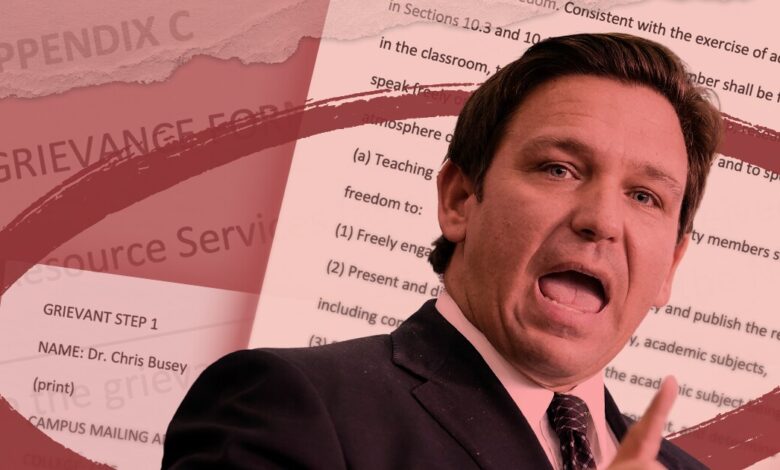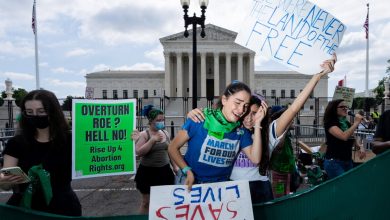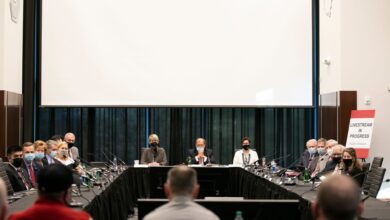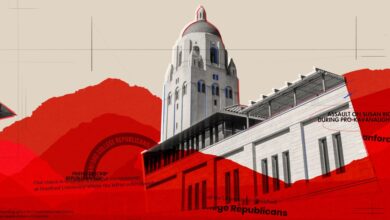U. of Florida Faculty Say Political Fears Stalled an Initiative on Race

A new grievance paints administrators as willing to compromise faculty autonomy to avoid riling Republican lawmakers.
The episode — as laid out in a grievance submitted on Sunday by the faculty union — paints a portrait of university administrators who are hesitant to rile a potentially hostile Republican Legislature, and who are willing to compromise faculty autonomy to avoid essentially poking the bear. The actions described are at odds with stated academic-freedom principles and could “tarnish” the university’s reputation, reads the grievance.
The complaint comes on the heels of news that UF had barred scholars from testifying in litigation against the state, which provoked outcry that the institution was buckling to partisan pressure. The university quickly reversed course and has said there was no undue external influence.
Chris Busey, who filed the grievance, told The Chronicle that the episode has been destabilizing and demoralizing. “I’ve never hid my identity as a race scholar. It was in my job talk. It was in my cover letter. It’s who I am as a scholar.” In other words, “You knew who I was when you hired me,” Busey said. “Don’t expect for me to change because Ron DeSantis said so.”
Steve Orlando, a university spokesman, said in an email that, pursuant to state law, any grievance matter would be confidential, and the university is therefore “unable to publicly acknowledge whether a grievance has been filed.” However, he said that the grievance, which The Chronicle sent to Orlando, contains “a number of inaccuracies, and we will address them through the appropriate processes.” Orlando declined to elaborate on what the inaccuracies are.
Busey is on the collective’s curriculum committee, which focused on how to understand racism and anti-racism in education. Eventually, the committee came up with a couple of proposals, including a doctoral concentration titled “Critical Study of Race, Ethnicity, and Culture in Education,” which would formalize a degree focus that’d been operating informally for years, Busey said.
The concentration “was designed, in part, to recruit new students, but also to allow us to give our existing students an opportunity to show what they had expertise in, which is helpful on the job market,” said Angela Kohnen, an associate professor in the College of Education. In part because the courses already exist, it seemed like relatively “low-hanging fruit,” she said. The committee also came up with another idea for a master’s-level certificate in anti-Black racism in education that could act as a “welcome mat,” of sorts, to the field, Kohnen said.
At the time, there was institutional excitement and momentum around these types of initiatives, Kohnen said. Then came roadblocks.
‘Critical’ actually has meaning in academia. It’s not just a word.
Over the spring and summer of 2021, critical race theory became a fixation among conservatives — including Gov. Ron DeSantis, who said that “the woke class wants to teach kids to hate each other, rather than teaching them how to read.” In late August, a state representative filed a bill that would ban critical race theory in government entities in Florida, including public universities. (The legislative session begins in January.)
By fall, Kohnen said, it was clear something was up. The concentration had been approved by the college’s curriculum committee and seemed to be languishing in the system. In late September, she, Busey, and other faculty members met with college administrators and Chris J. Hass, the associate provost for academic and faculty affairs. According to Busey, Kohnen, and Alyson Adams, a clinical professor in the College of Education, the meeting was unsettling. (Hass did not reply to an email or a voice-mail message.)
According to Busey’s notes from the meeting, Hass said that using the words “critical” and “race” together was an issue, and that they should consider renaming the concentration and/or delay putting it forward until the legislative session has ended. If it was moved forward now, it’d be flagged and stopped, he said. Busey’s notes state that Hass also invoked someone who was not present: Mark Kaplan, the university’s vice president for government and community relations. Hass said Kaplan has said the college is viewed favorably by the state, which is financially beneficial, and has advised that the college should avoid doing anything that could jeopardize that relationship, according to Busey’s notes.
Hass talked about the political realities of Florida and noted that W. Kent Fuchs, the president, and Joseph Glover, the provost, are “not in a position to protect the college,” according to Busey’s notes. For one thing, there have been “discussions” of removing Fuchs and replacing him with Richard Corcoran, former speaker of the Florida House of Representatives and Florida’s current education commissioner. So should they move forward with their curricular efforts, any consequences would be felt by the dean and the college, Hass said, according to Busey.
Hass also reportedly said that in the next legislative session, state legislators will seek to get rid of critical race theory, and that “we want to prevent a Trump-style ban.”
Kohnen and Adams remember the meeting similarly. According to Kohnen’s notes from the meeting, which were submitted as part of the grievance, Hass told the attendees that Fuchs is serving at the pleasure of the Board of Trustees, and that other state universities have been threatened with the replacement of their president by a political appointee like Corcoran. Hass also said — according to Kohnen — that Fuchs has not enacted mask or vaccine mandates because of threats to his job. Neither he nor Glover were willing to be fired if the college pressed the curriculum issue, the notes state.
According to Kohnen’s notes, Hass recommended that the education professors either remove “critical” from the name of the doctoral concentration, table it until the spring, or put it on ice and continue doing the work to “change the hearts and minds” of students. Though the conversation mostly focused on the concentration, Adams said, “we knew that they also meant there were implications for the certificate.”
I remember writing that down on paper. That the president and the provost do not have your backs.
Throughout the meeting, “many of us felt just really kind of stunned,” Kohnen said. Adams said she was “mouth open” surprised that altering the name of the concentration was being posed as “no big deal.” Adams said she was also struck by the notion that “people above us did not have our backs.”
“I remember writing that down on paper,” she said. “That the president and the provost do not have your backs.”
At one point during the meeting, Adams asked how the university could expect to attract and retain faculty of color if this work is not valued. According to Kohnen’s notes, Hass replied by saying something like, “I don’t know how I can look at you and say you shouldn’t look for another job.” Adams remembers Hass saying something like, “I understand, and I’m not sure I could tell them a reason to come or stay either.” Busey recalls it as being along the lines of: “How can I look you in the face and tell you that this is the best place that you should do your work? That you shouldn’t look for another job?”
When Busey, who is Black and studies critical race theory, logged off from the meeting, he felt like he needed to start looking for jobs elsewhere.
According to Busey’s notes, Good began the meeting by encouraging everyone to read House Bill 57, the anti-critical race theory legislation. Kaplan, the vice president, had relayed to Good and to the provost that “the people in Tallahassee want solutions, not critiques of them,” the dean told the group, according to Busey’s notes. The dean noted that “of all the flagships in the country, UF is the most vulnerable to state politics” because of the significant proportion of funding it receives from the state level. He indicated that he wanted things to move forward with the doctoral concentration but that the name would need to change, according to the notes.
Good’s message was “more gentle and I think diplomatic” than Hass’s, said Busey, but the bottom line was the same.
Good also said that Glover, the provost, would support a concentration that says “studies of race” but not critical studies of race, according to Busey. Glover did not respond to a message left with his assistant.
Good “was trying to communicate that he was in support of the concepts being brought up and taught and the ideas behind the concentration,” said Adams. Like, “I’m 100 percent behind you.” But also, “Change the words.” Those things seemed incongruent to Adams. “It just felt wrong.”
Kohnen also remembers the message of the October meeting being: “There’s no problem here. You can put everything forward. Just take off the word ‘critical’ and it’s fine.” They left unsatisfied. Busey met with Good again later in October. At that meeting, according to Busey’s notes, Good said that Hass may have “gotten ahead of himself.” Leadership is OK with a certificate including the phrase “anti-Black racism,” but he reiterated that the concentration cannot have the words “critical” and “race” be together, according to his notes from that meeting.
According to Busey, Good said: “We do not want to inflame Tallahassee. Everything else is a go and the leadership is behind our work if we just make those minor adjustments.”
But to Busey, that change isn’t minor. The suggestion feels like an insult to the scholarship that he and his colleagues do. “‘Critical’ actually has meaning in academia, you know,” said Kohnen. “It’s not just a word.”
“I do think our administration thinks they’re doing the right thing, and thinks that the curriculum content can still be taught and still be impacting our students in really powerful ways, if we could just slide it under the radar,” said Adams. “But that’s not acceptable. It’s not fair to my colleagues whose scholarship this is, whose courses this affects, whose students it affects. Are we supposed to be embarrassed of teaching critical race theory? Are we supposed to pretend we’re not doing it?”
Eventually Busey decided to file a grievance, arguing that the “intrusions into curricular matters represent an egregious and unprecedented violation of academic freedom.” Overall, he’s disheartened and discouraged. He’s not eager to consider the prospect of leaving Florida. He completed his undergraduate degree at UF and holds season tickets for football. “I’m a Gator.”
But “am I looking for other jobs?
“I kind of have to.”
Source link






